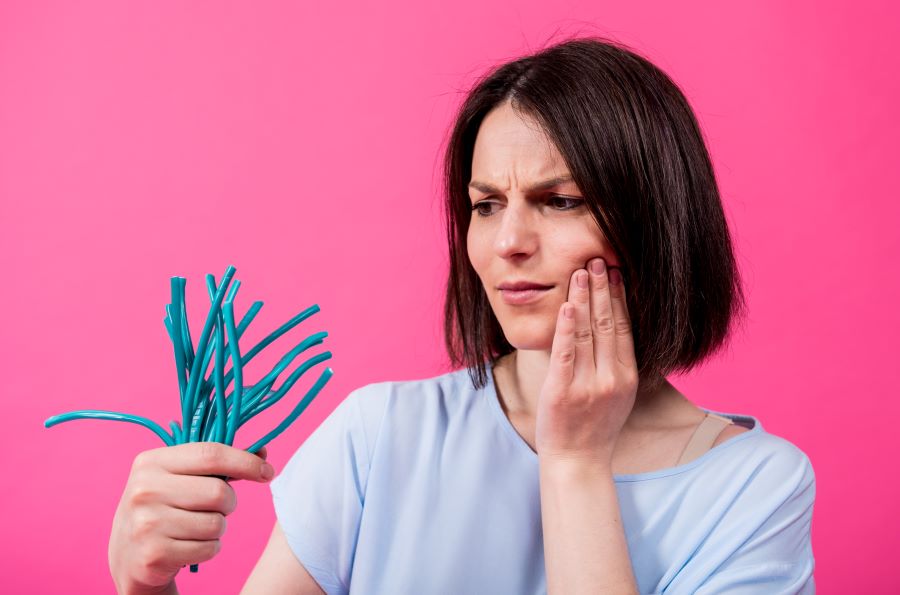

Tooth erosion is the wearing away of your tooth enamel, the outer protective layer of your teeth, by chemical or mechanical causes. When your tooth enamel becomes thin, your teeth become weaker and more vulnerable to stains and cavities. In other words, tooth erosion causes sensitivity in teeth. This problem is defined as the wearing away and thinning of tooth enamel due to contact with acidic substances. Tooth erosion is a health problem that is becoming increasingly common as a reflection of modern diet and lifestyle. Tooth enamel loss does not only cause aesthetic concerns, but can also lead to a number of health problems, including tooth sensitivity, cavities, and even tooth loss. Anyone can get tooth erosion. It is common in all age groups and affects approximately 50% of primary (baby) teeth and up to 45% of permanent (adult) teeth.
If this problem progresses, dental fillings or crowns may be needed. It is possible to stop the progression of erosion with early diagnosis and preventive measures. Therefore, it is important to go to the dentist regularly to prevent tooth erosion.
Acidic foods and drinks are among the most common causes of tooth erosion. Especially acidic fruits such as lemons and grapefruits and fizzy drinks can damage tooth enamel due to their acid content. In addition, stomach acid can also cause acid erosion on teeth. So, although this condition may seem like two different health problems, acid reflux and tooth erosion are factors that affect each other. People with gastroesophageal reflux disease (GERD) suffer from this condition. In addition, excessively harsh tooth brushing techniques and side effects of some medications can also contribute to tooth enamel erosion.
There are many different reasons that cause tooth erosion. The causes of tooth erosion are as follows:
Bruxism: This disease, also known as teeth grinding disorder, can lead to tooth erosion. When patients fall asleep at night, they unconsciously and involuntarily apply pressure to their teeth. When this happens every night, it causes tooth enamel to wear down and erosion over time.
Dry Mouth: The salivary glands help protect the teeth and gums in the mouth by producing adequate levels of saliva. If saliva production is inadequate, the mouth becomes dry and acids contribute to tooth sensitivity and erosion. Various medical conditions and side effects of medications can also cause dry mouth.
Diet Programs for weight loss: There is an important relationship between diet and tooth erosion. The foods we consume during the day, the snacks we have become accustomed to, and various foods can cause tooth erosion. Sweets cause tooth decay, bacteria formation, and this damages tooth enamel. In addition, when we do not eat enough or only consume fruits and vegetables while dieting, you can put both your general health and your oral and dental health at risk.
Various Problems in Digestion: One of the most important factors that cause tooth erosion is stomach acid. Because when it comes into the mouth and teeth, it negatively affects dental health. When stomach acid reaches the teeth due to digestive problems, it damages tooth enamel very much. In addition, when you wake up in the morning, discomforts such as nausea and vomiting also trigger stomach acid to reach the teeth and will lead to tooth erosion. Reflux will increase the stomach acid rate.
It is difficult to detect tooth erosion in the early stages of tooth erosion. Increasing tooth sensitivity is one of the most common early signs of tooth erosion. Changes in the appearance of teeth, such as teeth appearing more translucent or having rounded and smooth edges, may indicate that erosion is progressing.
Symptoms vary from person to person. Symptoms that indicate enamel erosion in the early stages are as follows:
As enamel erosion progresses, in other words, as it wears away more layers of your teeth, you may begin to feel pain. The effects of tooth erosion are likely to become more noticeable as the erosion gets closer to the tooth pulp.
The aim of treating tooth erosion is to repair existing damage and prevent its progression. Common treatment methods used are listed below:
For protecting enamel from erosion and strengthening it, fluoride gel or varnish can be applied. This also reduces sensitivity.
Special toothpastes or agents applied to the tooth surface to reduce sensitivity are one of the home remedies for tooth erosion.
Dental fillings and coatings are the most commonly applied tooth erosion solutions.
In cases where enamel loss is severe, porcelain or zirconia coated tooth erosion repair is applied to protect the teeth and provide an aesthetic appearance.
If erosion has caused gum recession or sensitivity, gum treatments may also be necessary.
It is especially necessary to avoid carbonated drinks and foods. You should brush your teeth and drink water after meals. You should not consume starchy and sugary foods.
Reflux and dry mouth are two common causes of tooth erosion. These are also health problems. Therefore, these conditions need to be treated not only for tooth erosion treatment but also for general health.
Using mouth moisturizers or medications to increase saliva production in a dry mouth is one of the tooth erosion solutions to be applied at home.
To maintain optimal oral health, you should visit your dentist regularly. Visiting your dentist at least once every six months is very important for oral and dental health. Tooth erosion is not an oral health problem that progresses quickly. You may feel this discomfort in the early stages of tooth erosion. In the early days of the problem, your dentist can give you dental advice for tooth erosion to stop its progression. Dentaliva offers you professional treatment for tooth erosion, as with other oral and dental treatments. If you experience sensitivity in your teeth or notice visual signs of tooth wear, such as chipping, pitting or discoloration, contact us without delay. Early treatment can prevent tooth erosion from getting worse.